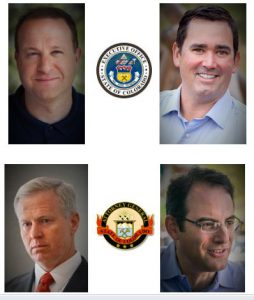In this Capitol Report:
- Statewide Opposition to Proposition 112 Grows to Unprecedented Levels!
- Colorado Chamber Committee Leads Efforts on Air Quality Rulemaking Process
- Now is the Time to Take Action...Register Colorado's 2018 Political Playoff.
- NLRB Proposes New, Common Sense Joint Employer Standard to Help Businesses
- Stay Tuned to Our Social Media Channels for Episode One of the Candidate Evangelist
Statewide Opposition to Proposition 112 Grows to Unprecedented Levels!
Over the last few weeks, the opposition to Proposition 112 requiring 2,500 setbacks on oil and gas development has grown to unprecedented levels and it extends to all corners of the state. The Colorado Chamber of Commerce, CACI, through its Board of Directors, have taken a position of “OPPOSE” to Proposition 112 which will appear on the November 2018 ballot. Protecting the jobs of Coloradans and ensuring long-term economic stability is the Colorado Chamber’s biggest priority, and we took this position because the effects Proposition 112 would have on employment, tax revenue and the overall economy are catastrophic for the state!
We would encourage CO Chamber members to review the research conducted by the REMI Partnership http://commonsensepolicyroundtable.org/oil-gas-setback-study/ revealing that over 147,000 workers across the state in many industries will lose their jobs in the next ten years if Proposition 112 were to pass. Those studies also show that if voters were to approve this ballot initiative, the State would see a $26 billion impact to its GDP by 2030 as well as a loss in state and local tax revenue to the tune of $230.85 million in the first year and $1 billion annually.
In addition to the Colorado Chamber of Commerce, over 34 local chambers of commerce and trade associations have taken the same position that Prop 112 is the wrong approach, as well as an ever-growing list of state and local leaders:
Chambers of Commerce:
- Colorado Chamber of Commerce, CACI
- South Metro Denver Chamber of Commerce
- Metro North Chamber of Commerce
- Highlands Ranch Chamber of Commerce
- Grand Junction Area Chamber of Commerce
- Colorado Business Roundtable
- Colorado Apartment Association
- Pikes Peak Association of REALTORS
- Northern Colorado Legislative Alliance
- Economic Development Council of Colorado
- Colorado Contractors Association
- Colorado Springs Chamber and EDC
- Associated General Contractors of Colorado
- Denver Metro Chamber of Commerce
- NFIB – Colorado
- Club 20
- City of Centennial
- Jefferson County Economic Development Corp.
- Northwest Douglas County Economic Development Corp.
- Aurora Chamber of Commerce
Industry/Trade Associations:
- Denver Metro Commercial Association of REALTORS
- Colorado Association of Homebuilders
- Colorado Bankers Association
- Colorado Association of REALTORS
- Colorado Association of Mechanical and Plumbing Contractors
- Mechanical Contractors Association of Colorado
- Mechanical Service Contractors Association of Colorado
- National Certified Pipe Welding Bureau, Colorado Chapter
- Colorado Farm Bureau
- Colorado Association of Wheat Growers
- GPA Midstream and GPA Midstream Rocky Mountain Chapter
- Housing & Building Association of Colorado Springs
- Colorado Cattlemen’s Association
- American Council of Engineering Companies (ACEC) of Colorado
Notably, over 19 Mayors of cities that represent both urban and rural areas across the state oppose the ballot initiative, as do gubernatorial candidates Congressman Jared Polis and State Treasurer Walker Stapleton who often differ on energy policy positions and an ever-growing list of elected officials:
Gubernatorial Candidates:
- State Treasurer Walker Stapleton
- Congressman Jared Polis
Mayors:
- Colorado Springs Mayor John Suthers
- Former Greeley Mayor Tom Norton
- Ault Mayor Rob Piotrowski
- Dacono Mayor Joe Baker
- Eaton Mayor Kevin Ross
- Evans Mayor Brian Rudy
- Fort Lupton Mayor Zo Stieber
- Greeley Mayor John Gates
- Hudson Mayor Dwayne Haynes
- Johnstown Mayor Scott James
- LaSalle Mayor Andy Martinez
- Milliken Mayor Beau Woodcock
- Platteville Mayor Adrienne Brossman Sandoval
- Severance Mayor Don McCleod
- Thornton Mayor Heidi Schoenenberger Williams
- Windsor Mayor Kristie Melendez
- Former Centennial Mayor Cathy Noon
- Glendale Mayor Mike Dunafon
- Lakewood Mayor Adam Paul
Elected Officials:
- State Representative Lois Landgraf
- State Representative Dave Williams
- State Representative Larry Liston
- State Representative Shane Sandridge
- State Representative Paul Lundeen
- State Representative Susan Beckman
- State Representative Terry Carver
- State Representative Paul Rosenthal
- Former House Majority Leader Amy Stephens
- Former State Representative Rob Fairbank
- Former State Representative Spencer Swalm
- Former State Representative Frank Defillipo
- State Senator Bob Gardner
- State Senator Jack Tate
- State Senator Owen Hill
- State Senator Kevin Priola
- State Senator and Joint Budget Committee Member Kent Lambert
- Former State Senator Bernie Herpin
- Former State Senator Andy McElhany
- Former State Senator Nancy Spence
- Former State Representative and Candidate for HD 17, Kit Roupe
- Arapahoe County Commissioner Jeff Baker
- El Paso County Commissioner Longinus Gonzalez
- El Paso County Commissioner Mark Waller
- El Paso County Commissioner Peggy Littleton
- El Paso County Commissioner Stan VanderWerf
- El Paso County Commissioner Dennis Hisey
- Weld County Commissioner Sean Conway
- Weld County Commissioner Julie Cozad
- Weld County Commissioner Mike Freeman
- Weld County Commissioner Barbara Kirkmeyer
- Weld County Commissioner Steve Moreno
- Former Douglas County Commissioner Mary Michael Cooke
- Colorado Springs City Councilman Andy Pico
- Colorado Springs City Councilman Tom Strand
- Colorado Springs City Councilman Don Knight
- Colorado Springs City Councilman Merv Bennett
- Colorado Springs City Councilwoman Jill Gaebler
- Former Douglas County School Board President Kevin Larsen
Please contact Loren Furman at [email protected] or at 303-866-9642 if you have any questions regarding this issue AND if your local chamber of commerce, trade association or company would like to be part of this coalition against Proposition 112.
Thank you!
Colorado Chamber Committee Leads Efforts on Air Quality Rulemaking Process
This past session, House Bill 18-1400, which the Colorado Chamber supported, increased the statutory fee caps for stationary sources of air pollutants by approximately 25%. The bill also required the Air Pollution Control Division to convene a stakeholder group consisting of affected industries to
(1) identify and assess measures to improve billing practices and increase accounting transparency; and
(2) assess potential efficiency improvements with respect to division activities.
Since the enactment of HB 18-1400, the Chamber’s Air Quality Committee, led by committee chair Andrea Huggins, has spent numerous hours working with the APCD on the implementation of HB 18-1400.
Because HB 18-1400 only increased the statutory fee caps, not the actual fees, the Air Quality Control Commission must hold a rulemaking hearing to consider increasing the actual fees charged to stationary sources – APEN, permit processing and annual emission fees. In July, the AQCC gave notice that it intended to hold this rulemaking at its October 18th meeting. Although the committee does not have any issues with the proposed fee increases – the AQCC is considering increasing the fees to the caps authorized in HB 18-1400 – the Colorado Chamber petitioned for and received party status to preserve its right to fully participate in the rulemaking proceeding in the event the proposal changes and to ensure that the division efficiencies identified in the stakeholder process continue to be highlighted.
Air Quality Committee Chair Andrea Huggins has taken the lead for all affected industries during the stakeholder process required by HB 18-1400. Together with other members of the Air Committee, Andrea has worked with the APCD and other stakeholders to identify 50 potential efficiencies to streamline the division’s business practices.
The intent of these efficiencies is to save time and money for the division, thereby reducing the need for any future fees increases, and save time and money for the affected businesses. Each industry group has prioritized each efficiency item (1 = high priority, 2 = medium priority, 3 = lower priority). The most-recent version of the prioritized efficiency items can be downloaded here. Members of the Air Quality Committee have been meeting with the APCD on a biweekly basis since July. Our next meeting with the Division is Monday, September 24th from 2:00 to 4:00 pm in our conference room located at 1600 Broadway, Ste. 1000, Denver.
If you have any questions or would like additional information about either the fee increase rulemaking or the stakeholder process, please contact Bill Skewes at [email protected].
Now is the Time to Take Action...Register Colorado's 2018 Political Playoff.
Join Us Thursday, October 25th for Colorado’s 2018 Political Playoff
Polis (D) and Stapleton (R)-Governor
Brauchler (R) and Weiser (D)- Attorney General
Westin Denver Downtown, Confluence Ballroom
1672 Lawrence Street, Denver, CO 80202
Registration & Networking: 11:00 a.m. – 11:45 a.m.
Luncheon & Program: 11:45 a.m. – 1:30 p.m.
Please visit our website for more information or to register for the luncheon
NLRB Proposes New, Common Sense Joint Employer Standard to Help Businesses
In 2015 under the Obama Administration, the previous National Labor Relations Board (NLRB) followed a union-sought tightening of the existing Browning-Ferris legal standard for enforcing “joint employment” – creating turmoil and risk for employers, and calling into question business and manufacturer relationships with contractors across all industries. The tightening of Browning-Ferris also put independent franchise businesses at jeopardy by eliminating access to Small Business Administration (SBA) programs. (For more background, see below)
As proposed by the current NLRB,
a joint employer relationship would only be found where employers “possess and actually exercise substantial direct and immediate control” over employees’ conditions of employment like hiring, firing, discipline, and supervision.
“The Board believes that this rulemaking will foster predictability and consistency regarding determinations of joint-employer status in a variety of business relationships, thereby promoting labor-management stability, one of the principal purposes of the Act.”
To comment: If you wish to help the Colorado Chamber and our partners at the National Association of Manufacturers (NAM) move this proposed rule forward and restore common sense joint employer standards, please submit comments to the NLRB via this www.Regulations.gov link. Comments must be submitted by 12/Midnight EST on November 13, 2018.
Additional background from the NLRB can be found in the Federal Register and via the regulations.gov website:
“The last three years have seen much volatility in the Board’s law governing joint-employer relationships. As detailed below, in August 2015, a divided Board overruled longstanding precedent and substantially relaxed the evidentiary requirements for finding a joint employer relationship. Browning-Ferris Industries of California, Inc., d/b/a BFI Newby Island Recyclery, 362 NLRB No. 186 (2015) (Browning-Ferris), petition for review docketed Browning-Ferris Indus. of Cal.v. NLRB, No. 16-1028 (D.C. Cir. filed Jan. 20, 2016).
Then, in December 2017, a different Board majority restored the prior, more stringent standard. In February 2018, the Board vacated its December 2017 decision, effectively changing the law back again to the relaxed standard of Browning-Ferris. A petition for review challenging Browning-Ferris’ s adoption of the relaxed standard as beyond the Board’s statutory authority is currently pending in the United States Court of Appeals for the District of Columbia Circuit. In light of the continuing uncertainty in the labor-management community created by these adjudicatory variations in defining the appropriate joint-employer standard under the Act, and for the reasons explained below, the Board proposes to address the issue through the rulemaking procedure.”


